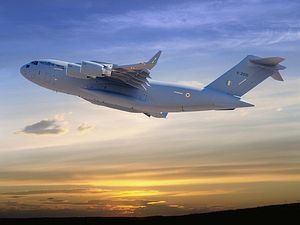The Japan Air Self Defense Force (JASDF) and Indian Air Force (IAF) are conducting their first joint air exercise, dubbed Shinyu Maitri-1 (“true” or “best friend”), focusing on joint mobility and humanitarian assistance & disaster relief (HADR) operations from December 3 to 7 in the northern Indian state of Uttar Pradesh, according to the Indian Ministry of Defense (MoD).
“The focus of the exercise is set for the IAF and JASDF crews to undertake Joint Mobility/HADR operations,” the MoD notes in a December 3 statement. “Display of heavy loading/ off-loading are also planned to be practiced during this exercise.” The IAF has dispatched Antonov AN-32 and C-16 Globemaster transport aircraft, while the JASDF has sent Kawasaki C-2 military transport aircraft to participate in the drill. According to Japan’s Defense Minister Takeshi Iwaya, the goal of the exercise is to increase the air transport capabilities of the JSDF, and to enhance the “mutual understanding between Japan and India, and bolstering our relationship of trust.”
This is not the only activity of the JASDF this month in India. Notably, elements of the JASDF will also observe the first iteration of a U.S-India bilateral air warfare exercise known as Cope India in over a decade. The exercise is taking place from December 3 to 10 at Air Station Kalaikunda and Air Station Arjan Singh, both of which are in India’s eastern West Bengal state and will involve U.S. F-15C/D Eagle fighter jets, C-130 Hercules transport aircraft, as well as Su-30MKI Flanker-H, Mirage 2000 fighter jets, and Jaguar combat jets, among others, on the Indian side.
As my colleague Ankit Panda reported earlier, India and Japan also concluded their first land-based joint military exercise last month in the northeastern Indian state of Mizoram. “The primary focus of the exercise was to train and equip the contingents to undertake joint counter-insurgency and counter-terrorist operations in urban and semi urban terrain,” according to a November MoD press release.
While military cooperation between the Indian Army and the Japan Ground Self Defense Force as well as the two air forces remains in its infancy, the Indian Navy and Japan’s Maritime Self Defense Force (JMSDF) have been forging closer ties for a number of years.
Notably, India and Japan have started formal negotiations over a so-called acquisition and cross-servicing agreement (ACSA) this year, which would allow the Indian Navy access to a Japan Maritime Self Defense Force (JMSDF) base in Djibouti, while the latter would be allowed to use Indian naval installations on, for example, the Andaman and Nicobar Islands located in the Indian Ocean, next to other naval facilities.
In the fall of 2017, the Indian Navy and JMSDF also held an air-based anti-submarine warfare exercise in the Indian Ocean. Furthermore in 2015, Japan also became a permanent member of the Malabar naval exercise involving aircraft, ships, and personnel from the Indian, Japanese, and U.S. navies. The 22nd rendition of the naval exercise took place in June 2018 off the coast of Guam.

































